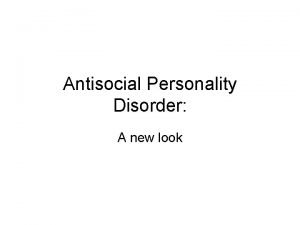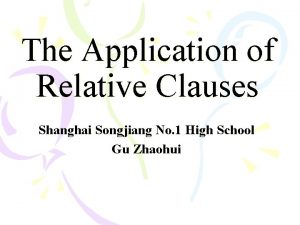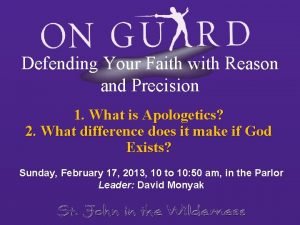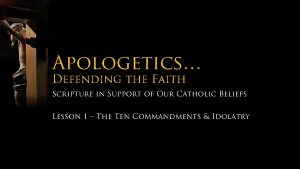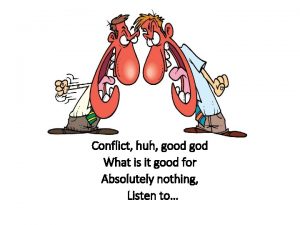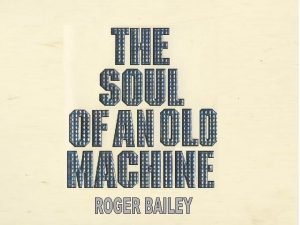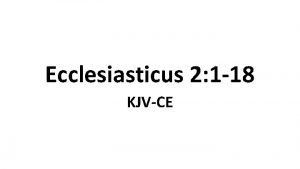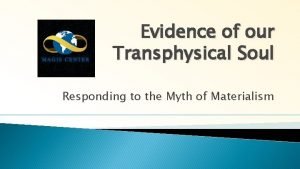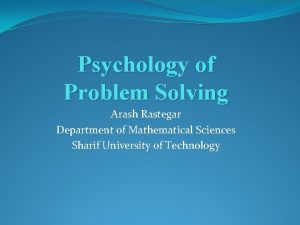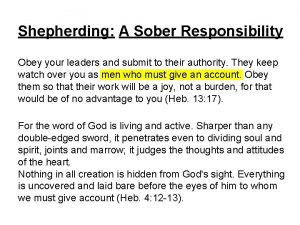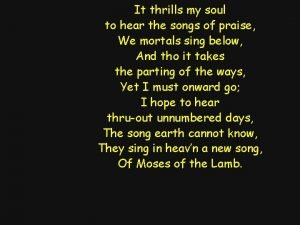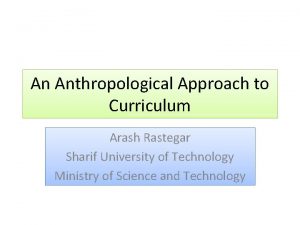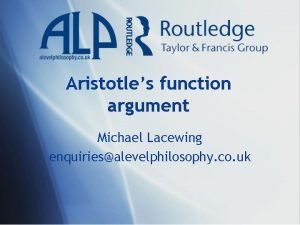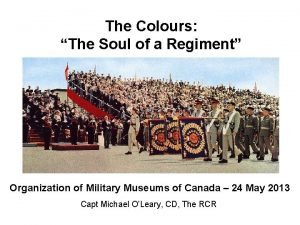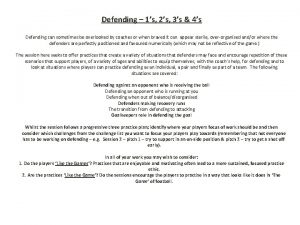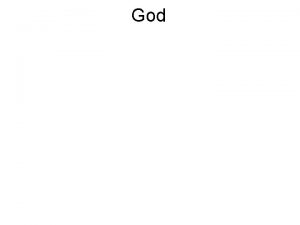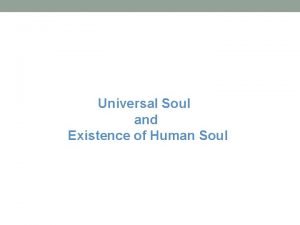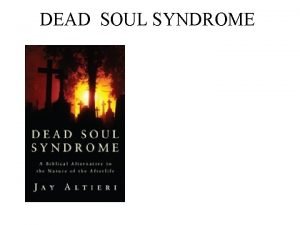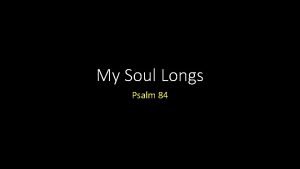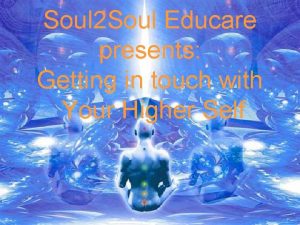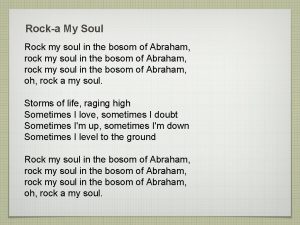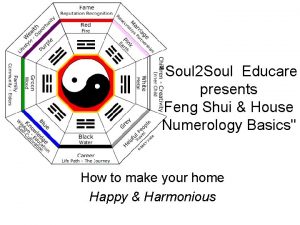Defending the Soul From the Soul to God



















![Excluding consciousness from science does not diminish its reality. “[T]he fact that physics is Excluding consciousness from science does not diminish its reality. “[T]he fact that physics is](https://slidetodoc.com/presentation_image_h2/dd40b19c52e3509e192ee2ef760a1231/image-20.jpg)

![Quantum theory suggests a role for conscious observers in science. “[T]he choice made by Quantum theory suggests a role for conscious observers in science. “[T]he choice made by](https://slidetodoc.com/presentation_image_h2/dd40b19c52e3509e192ee2ef760a1231/image-22.jpg)


























































- Slides: 80

Defending the Soul & From the Soul to God Dr. Angus Menuge Concordia University Wisconsin 1

1. What are Souls? Souls are recognized by classical philosophy and Christian theology. ◦ Plato argued for the immortality of the soul, but viewed the body as a prison. Scripture speaks of body, spirit and soul (1 Thessalonians 5: 23). These 3 dimensions are intended to exist in an integrated whole. 2

A whole person consists of: 1) Body (soma). ◦ Physical organism. 2) Spirit (pneuma). ◦ Passive recipient of inspiration. 3) Soul (psyche). ◦ Active seat of reason and volition. 3

The Soul Defined. A non-material substance ◦ Modes include thought, reason, volition ◦ A mode is an inseparable part of a substance. ◦ No-one else can have Jack’s thought that Denmark is beautiful. ◦ There are no ownerless thoughts. 4

How is the Soul Different From the Brain? Souls are Not Physical Aggregates of impersonal, separable parts like the brain. ◦ A neuron remains the same if removed from Jack’s brain or put into Sarah’s brain. ◦ There can be ownerless neurons. Souls are Simple (not composed of parts). ◦ Thoughts are inseparable from thinkers. ◦ Thoughts are intrinsically personal. 5

Materialism denies the soul. Materialism denies there can be irreducibly mental substances. Everything must reduce to, or depend on the physical. Materialists have 3 main arguments against the soul. 6

2. Three Materialist Arguments Against the Soul. A. Locked Out: ◦ The Physical World is Closed to Souls. B. Violators: ◦ Souls Violate Physical Laws. C. Redundant: ◦ Souls Explain Nothing. 7

A. Locked Out. If souls exist, they can change what happens in the physical world (“downward causation”). ◦ Since my soul chose to wave to a friend, my arm moves. This violates the “causal closure of the physical. ” Materialists claim that every physical event has a sufficient physical cause. 8

The Causal Closure of the Physical (CCP): “Pick any physical event…and trace its causal ancestry…as far as you would like…this will never take you outside of the physical domain. ” --Jaegwon Kim, Philosophy of Mind, second edition, Cambridge, MA: Westview Press, 2006, 194 -195. CCP is required for materialism because it rejects dualism. 9

Why believe CCP? CCP is assumed by the “In Principle Completeness of Physics” (IPCP). “the possibility of a complete and comprehensive physical theory of all physical phenomena. ” ◦ --Jaegwon Kim, Mind in a Physical World (Cambridge, MA: MIT Press, 1998), 40. 10

B. Violators. Downward (mental-to-physical) causation would violate laws of physics. ◦ If any physical event is the result of some prior physical cause governed by physical law, then a mental feature could only make a difference by altering the event, thereby violating the law. 11

Conservation of Energy? Causation The involves a transfer of energy. Law of Conservation of Energy: ◦ the total amount of energy in an isolated system remains constant. ◦ energy cannot be created or destroyed. If the soul changed a physical system, it would create energy and violate the Law of Conservation of Energy. 12

C. Redundant. The Soul is an Obsolete idea. Whenever someone says “The soul does X, ” there is a purely physical, neurological explanation of X. There is nothing the soul can do that the brain couldn’t do by itself. 13

HELP STAMP OUT AND ABOLISH REDUNDANCY A Message from the Society for the Abolishment and Removal of Redundancy in Society 14

3. In Defense of the Soul. A. Make Way for the Soul. ◦ Against Causal Closure. B. Souls Are Innocent! ◦ They Don’t Violate Laws. C. Souls Have Work to Do. ◦ They are not Redundant. 15

A. Make Way for the Soul: Against Causal Closure. The Causal Closure of the Physical (CCP) is supported by: The In Principle Completeness of Physics (IPCP). But IPCP is a speculative and dubious principle. 16

What is a completed physics? Can’t define it by current physical theories: ◦ they are not comprehensive and complete Can’t define it by future theories: ◦ Maybe they don’t exist or we have unsurpassable cognitive limitations ◦ Maybe a complete physical theory will simply include mental properties! 17

A completed physics might include a causal role for subjective observers If so, physics would refute physicalism! Physics would allow downward mental causes Physics would be incompatible with CCP 18

How the observer was excluded from science. “In the dualistic, mechanical philosophy that dominated the rise of modern science…conscious experience was effectively removed from nature and, therefore, from the objective domain of science. ” B. Allan Wallace, The Taboo of Subjectivity: Toward a New Science of Consciousness (New York: Oxford University Press, 2000), 123. 19
![Excluding consciousness from science does not diminish its reality The fact that physics is Excluding consciousness from science does not diminish its reality. “[T]he fact that physics is](https://slidetodoc.com/presentation_image_h2/dd40b19c52e3509e192ee2ef760a1231/image-20.jpg)
Excluding consciousness from science does not diminish its reality. “[T]he fact that physics is silent about such features. . provides no grounds whatsoever for holding that such features don’t exist, or are inherently unintelligible if they do exist. ” Nicholas Maxwell, “The Mind-Body Problem and Explanatory Dualism, ”. ” Philosophy, Vol. 75, No. 291 (Jan, 2000), 49 -71, 51. 20

Thomas Nagel (Mind and Cosmos). Any comprehensive and complete account of reality must include an explanation of consciousness. “one cannot really understand the scientific world view unless one assumes that the intelligibility of the world…is itself part of the deepest explanation of why things are as they are. ” Thomas Nagel, Mind and Cosmos (New York: Oxford University Press, 2012), 17. 21
![Quantum theory suggests a role for conscious observers in science The choice made by Quantum theory suggests a role for conscious observers in science. “[T]he choice made by](https://slidetodoc.com/presentation_image_h2/dd40b19c52e3509e192ee2ef760a1231/image-22.jpg)
Quantum theory suggests a role for conscious observers in science. “[T]he choice made by an observer about what sort of knowledge to seek can profoundly affect the knowledge that can ever be received. . the choice made by the observer about how he or she will act. . . has… a profound effect on the physical system being acted on. ” Jeffrey M Schwartz, Henry P. Stapp, and Mario Beauregard, “Quantum physics in neuroscience and psychology: a neurophysical model of mind-brain interaction. ” Philosophical Transactions of the Royal Society Series B (2004) 1 -19, 7. 22

The Quantum Zeno Effect. The frequency of a quantum state’s observation is proportional to the degree of its fixation (the “watched pot” effect). Maybe the brain is a quantum system, and there are many action templates in “superposition” (all have a certain probability). Conscious attention may play a role in fixating one of these. 23

Empirical evidence consciousness plays a causal role. 1) The biological cost of consciousness. ◦ Why do biologically costly conscious states reliably preview actions if they don’t cause them? 2) Cognitive therapy for neurological disorders. 3) The Placebo Effect. 4) Psychoneuroimmunology. 24

1) The Cost of Consciousness. (1) If consciousness does nothing why was it selected (it is biologically expensive)? (2) If consciousness does nothing, why do our conscious intentions reliably track our actions? ◦ If consciousness does nothing and natural selection only cares about useful behaviors, most likely our conscious states would not reliably track our actions. ◦ If my body runs away from lions, it does not matter if I am consciously intending to be devoured by the lion. 25

2) Cognitive Therapy for Obsessive Compulsive Disorder (OCD). “willful, mindful effort can alter brain function, and. . . such self-directed brain changes—neuroplasticity—are a genuine reality. . . In other words, the arrow of causation relating brain and mind must be bidirectional. ” --Jeffrey M. Schwartz and Sharon Begley, The Mind and the Brain: Neuroplasticity and The Power of Mental Force (New York: Harper. Collins, 2002) , 94 -95. 26

3) The Placebo Effect. “The placebo effect depends on a patient’s trust in the physician. I’ve become convinced that this relationship is more important, in the long run, than any medicine or procedure. Psychiatrist Jerome Frank of Johns Hopkins University found evidence for this belief in a study of ninety-eight patients who had surgery for detached retinas. Frank assessed the subjects’ independence, optimism, and faith in their doctors before the operations, and found that those with a high level of trust healed faster than the others. ” --Bernie S. Siegel, M. D. , Love, Medicine and Miracles: Lessons Learned About Self-Healing From a Surgeon’s Experience with Exceptional Patients (New York: Harper & Row Publishers, 1986), 37. 27

4) Psychoneuroimmunology. A 2004 study explored the affect of MBSR on cancer patients who are hospitalized for a long time with stem cell / autologous bone marrow transplants, and found “a statistically significant decrease in pain. . . and increases in the levels of relaxation. . . happiness. . . comfort. . . reduced heart rate. . . and respiratory rate. ” Other studies have shown benefits from MBSR in “decreasing anxiety, depression, anger, demoralization, and symptoms of somatic fatigue in male and female cancer patients. ” ---Mary Jane Ott, Rebecca L. Norris and Susan M. Bauer. Wu, “Mindfulness Meditation for Oncology Patients: A Discussion and Critical Review, ” Integrative Cancer Therapies 2006, p. 106. 28

CCP is most likely false: As science progresses, it seems to require an active role for the observer. Therefore downward (mental-to-physical) causation is possible. Therefore CCP is false. 29

B. Souls are Innocent! They Don’t Violate Physical Laws. Physical laws do not say that an effect must happen under all conditions. They say: If there is the right cause and if we have the right initial conditions, then the effect will happen. 30

Laws don’t preclude intervention. B A Given the initial conditions and motion of ball A, one can compute the motion of ball B using Newton’s laws. 31

Laws don’t preclude intervention. Making a mental choice to change the initial conditions (jogging the table) or to change the cause (choosing to aim for a different pocket) does not violate the law. Laws are conditionals that hold ceteris paribus (other things being equal). But if someone makes a different mental choice, other things aren’t equal. 32

Actual conditions include choice of this pocket: Possible conditions could include choice of this pocket: Different causes or initial conditions do not violate Newton’s Laws. 33

The Real Issue: It is not the laws of physics but the assumption that the physical is causally closed (CCP) that would lock out mental causes. As we saw, we do not have good reason to say that CCP is true. CCP begs the question in favor of physicalism instead of allowing the evidence to decide. 34

Conservation of energy? The conservation law: (1) “The total amount of energy in an isolated system remains constant” Downward mental causation is compatible with this law because the system is not isolated. • But what about this version? (2) “Energy cannot be created or destroyed. ” 35

Creating energy? The 2 formulations of the law are not equivalent. (Robert Larmer, The Legitimacy of Miracle [Rowman and Littlefield, 2014]). (1) “The total amount of energy in an isolated system remains constant” does not imply: (2) “Energy cannot be created or destroyed. ” (2) Is implausible because mass-energy came into existence a finite time ago. 36

Not all causation is an energy transaction (Robin Collins). Energy conservation cannot be defined “for the gravitational field in general relativity, ” yet “Gravitational fields…clearly have real physical effects on matter. ” John Bell showed that there are correlations between quantum phenomena “that cannot be explained by an exchange of energy. ” ◦ The correlations would require signals faster than the speed of light. Robin Collins, “The Energy of the Soul, ” in eds. Mark C. Baker and Stewart Goetz, The Soul Hypothesis: Investigations into the Existence of the Soul (New York: 37

C. Souls Have Work to Do: They are not Redundant. CCP is most likely false. Souls But do not need to violate physical laws. what are they good for? What could they explain that we couldn’t explain by brain states? 38

What souls can explain: 1) Souls explain our ability to consciously reason. ◦ Angus Menuge, “The Ontological Argument From Reason, “ Philosophia Christi, 13(1), 2011, 59 -74. 2) Souls explain our ability to come to know the world as it is. ◦ R. Scott Smith, Naturalism and Our Knowledge of Reality (Farnham, UK: Ashgate, 2012). 39

1) Souls explain our ability to consciously reason. Reasoning requires: A) A conscious self that is united at a time. B) A conscious self that persists over time. C) Subjectivity. D) Intentionality. 40

A) A conscious self that is united at a time. In order to draw the conclusion that A = C, Jack must unite the beliefs that A = B, and that B = C, in one consciousness. Otherwise B, it is like Adam believing that A = and Sarah believing that B = C. Neither Adam nor Sarah has (in those beliefs) a reason to conclude that A = C. 41

Dennett on the brain: “there is no one place in the brain through which all these causal trains must pass in order to deposit their content. ” –Daniel Dennett, Consciousness Explained, 135. So it is not possible for Jack to unite his beliefs (that A = B and B = C) in consciousness at the same time. So, there is no entity that can reason to the conclusion (that A = C). 42

How does the soul help? Thoughts are modes of thinkers. Several thoughts can be modes of the same soul. ◦ e. g. feeling cold, wanting to put a coat on, liking warmth. These thoughts belong to the same conscious subject. 43

B) A conscious self that persists over time. In order to draw the conclusion that A = C, “Jack” must be the same conscious self at t 2 as he was at t 1. Otherwise it is like Adam believing that A = B and that B = C, but Sarah believing that A = C. Neither Adam nor Sarah has reasoned to the conclusion that A = C. 44

What does materialism say? As a physical aggregate, the brain is in a state of constant flux. There is no enduring “base-line” brain state that is always present. “No single brain area is active when we are conscious and idle when we are not. Nor does a specific level of activity in neurons signify that we are conscious. Nor is there a chemistry in neurons that always indicates consciousness. ” —Mario Beauregard and Denyse O’Leary, The Spiritual Brain: A Neuroscientist’s case for the Existence of the Soul (New York: Harper. Collins, 2007), 109. 45

Reasoning takes time. If materialism is true, there is no one thing which endures from: t 1 (when the reasons are recognized) until t 2 (when the conclusion is drawn). If “Jack” is not the same thing at t 2 that he was at t 1, he did not reason to the conclusion. 46

How does the soul help? The soul as a mental substance remains essentially the same subject over time. It may focus on different thoughts and there may be changes in the body, but it persists as one thinking subject. The same soul considers the premises at t 1 and draws the conclusion at t 2. 47

C) Subjectivity. In order for Jack to reason to the conclusion, he must interpret the content of his beliefs (A = B and B = C) and try to mentally see what follows from them (A = C). Only a subject is capable of interpreting its states and seeing their consequences. Notice that computers do not interpret their output or see what it means. 48

What does materialism say? We are organic computers, and like computers, all our states and transitions can be fully understood in impersonal terms. A computer makes transitions in agreement with reason, but it isn’t reasoning. Why? The computer does not see that a conclusion follows: it lacks subjectivity. 49

How does the soul help. The soul is a particular subject. It is intrinsically subjective and provides a unique point of view on the world. The soul can interpret its own thoughts and see what follows from them. 50

D) Intentionality. Thoughts are about something beyond themselves (e. g. the Eiffel Tower). They have “intentional content” (e. g. the thought that the Eiffel Tower is in Paris). Jack’s act of reasoning is based on the intentional content of his beliefs (what he believes, that A = B, and that B = C). The conclusion that A = C also has intentional content. It is only rational if it is derived from the intentional content of the beliefs. 51

What does materialism say? Physically described systems do not exhibit intentionality. A rock or a computer’s states are not about anything (except relative to our interpretation). The physically described states of the human brain are not about anything. 52

Vanishing reasons. A consistent materialism must say: Intentional states are either non-existent or have no causal power. So, Jack might transition to a state containing the information that A = C, but not because of the content of his prior beliefs. This is not an account of Jack reasoning, but only of transitions in agreement with 53

How does the soul help? If the soul exists, there can be intrinsically mental states. Thoughts are by nature of their objects: ◦ There is intrinsic intentionality (aboutness). ◦ A thought about a vacation in Copenhagen could not have been the same thought if it were about Chernobyl instead. 54

2) The Argument from Knowledge (R. Scott Smith). How do we come to know an apple? 55

2) The Argument from Knowledge (R. Scott Smith). How do we come to know an apple? ◦ We form an apple concept by experiencing many apples and noticing similarities. ◦ We know an apple is there by matching the object with our concept of an apple. 56

What does materialism say? Materialism denies intrinsic intentionality: experience is not intrinsically of an apple. ◦ All we do is take our brain states to be about apples. ◦ We have no access to apples themselves to verify our concept is accurate. ◦ Materialism cannot explain how we form valid apple concepts that are based on apples. 57

How do we know? Forming concepts requires comparing an initial concept to experience. Knowing something requires matching the concept with an object of experience. ◦ Both assume it is one and the same subject that does the comparison and matching. ◦ This requires a unified, persisting mental entity—a soul. 58

Why science requires a soul. Science depends on the ideas of reasoning and knowledge. If reasoning and knowledge require a soul, science requires a soul. Materialism undercuts science and hence itself by denying the soul. 59

Conclusion 1. 1) We don’t know the physical world is causally closed to souls. 2) Souls do not need to violate physical laws. 3) Science has not shown souls are redundant. ◦ Souls are required to explain the capacity for rationality and knowledge presupposed by science. 60

From Soul to God Arguments from the nature of the soul to God: A) The Argument from Consciousness B) The Argument From Reason C) The Argument From Moral Norms 61

A) The Argument from Consciousness 2 features of consciousness point to God: 1) Consciousness is intrinsically personal 2) Consciousness is simple 62

1) Consciousness is intrinsically personal Materialism claims that in the beginning, there are just blind, impersonal processes ◦ It does not explain or predict the emergence of a conscious subject ◦ Material objects are aggregates of separable parts ◦ Thoughts are intrinsically subjective an inseparable from thinkers 63

J. P. Moreland’s argument from Consciousness I. (P 1) Genuine non-physical mental states exist. ◦ So there are intrinsically personal states (P 2) There is an explanation for the existence of mental states. ◦ They are unexpected and contingent. ◦ They cannot be a brute fact, as Thomas Nagel concedes in his Mind and Cosmos. 64

J. P. Moreland’s argument from Consciousness II. (P 3) Personal explanation is different from natural scientific explanation. ◦ Personal explanations cite the personal goals and intentions of a subject. ◦ Natural scientific explanation is impersonal. (P 4) The explanation for the existence of mental states is either personal or impersonal. 65

J. P. Moreland’s argument from Consciousness III. (P 5) The explanation is not impersonal. ◦ This is the “hard problem of consciousness. ” ◦ Nothing about the impersonal processes studied by natural science explains, predicts, or even suggests the emergence of consciousness. (P 6) Therefore, the explanation is personal. 66

J. P. Moreland’s argument from Consciousness IV. (7) If the explanation is personal, then it is theistic. ◦ Only a supernatural, necessary person (God) can explain the origin of contingent intrinsically personal states. (8) Therefore, the explanation is theistic. 67

(2) The simplicity of consciousness (1) Consciousness is a unity of inseparable parts (2) So consciousness cannot be composed from a complex aggregate of parts (3) Therefore contingent consciousness must arise from a necessary consciousness with the same kind of simplicity (God) 68

B) The Argument From Reason 1) 2) Naturalism predicts unreliable minds Theism predicts reliable minds 3) Theism best explains the reliability of human reason 69

1) Naturalism predicts unreliable minds “our brains were shaped for fitness, not for truth. ”--Steven Pinker, How the Mind Works (New York: W. W. Norton and Company, 1997), 305. “our brains contain a belief generating machine, an engine that can produce beliefs with little relation to what is actually true. ”--Lewis Wolpert, Six Impossible Things Before Breakfast : The Evolutionary Origins of Belief (New York: W. W. Norton and Company, 2007), 140. 70

2) Theism predicts reliable minds The Christian Theist: “is not committed to the view that reason is a comparatively recent development moulded by a process of selection. . . For him, reason—the reason of God—is older than Nature, and from it the orderliness of Nature, which alone enables us to know her, is derived. For him, the human mind in the act of knowing is illuminated by the divine reason. ” —C. S. Lewis, Miracles (New York: Macmillan, 1960), 34. 71

3) Theism best explains the reliability of human reason Divine Logos Laws of Nature Human Reason

C) The Argument From Moral Norms Souls can grasp objective moral norms. ◦ They hold of normative necessity. They do not arise from the contingent interactions of an individual or species with the environment Therefore, objective moral norms do not arise from nature 73

Craig’s Moral Argument. (P 1) If God does not exist, objective moral values and duties do not exist. (P 2) Objective moral values and duties do exist. (C) Therefore, God exists. ◦ --William Lane Craig, Reasonable Faith: Christian Truth and Apologetics. Third Edition (Wheaton, IL: Crossway Books, 2008). 74

The Existence of Objective Moral Values and Duties Depends on the Existence of God. It is not an epistemological argument: ◦ It is not saying that an atheist cannot have true moral beliefs or act morally ◦ Scripture teaches unbelievers can be moral (Romans 2: 14 -15) It is an ontological argument: ◦ the existence of objective moral values and duties depends on the existence of God. 75

Matter does not prescribe. A moral law requires a moral law giver. Natural events governed by undirected processes have no moral implications. “objective intrinsically prescriptive features … constitute so odd a cluster of qualities and relations that they are most unlikely to have arisen in the ordinary course of events, without an all-powerful god to create them”--J. L. Mackie, The Miracle of Theism (New York: Oxford University Press, 1983), 115. 76

Does Evil Exist? 77

78

79

Recommended reading: Baker and Goetz, eds. , The Soul Hypothesis. Baggett and Walls, Good God: Theistic Foundations of Morality. Beauregard and O’Leary, The Spiritual Brain. Goetz and Taliaferro, Naturalism, A Brief History of the Soul. Larmer, The Legitimacy of Miracle. Menuge, Agents Under Fire. Moreland, Consciousness and the Existence of God, The Recalcitrant Imago Dei, The Soul. Nagel, Mind and Cosmos. Smith, Naturalism and our Knowledge of Reality, In Search of Moral Knowledge Swinburne, Mind, Brain, and Free Will. 80
 Cisco self defending network
Cisco self defending network Attacking and defending a castle
Attacking and defending a castle Covetous antisocial
Covetous antisocial Advantages of self defending networks
Advantages of self defending networks Defending and non defining relative clauses
Defending and non defining relative clauses Was magellan worth defending?
Was magellan worth defending? On guard defending your faith with reason and precision
On guard defending your faith with reason and precision Defending sola scriptura
Defending sola scriptura What is maycombs usual disease
What is maycombs usual disease Defending the faith verses
Defending the faith verses Be still my soul my savior god to thee
Be still my soul my savior god to thee I hear the rolling thunder hymn
I hear the rolling thunder hymn My god is an awesome god he reigns
My god is an awesome god he reigns God-given virtues that direct us to our loving, triune god.
God-given virtues that direct us to our loving, triune god. God is good god is great speed
God is good god is great speed God is an awesome god and greatly to be praised
God is an awesome god and greatly to be praised My god's bigger than your god
My god's bigger than your god O god you are my god earnestly i seek you
O god you are my god earnestly i seek you Our god is an awesome god vine
Our god is an awesome god vine God-given virtues that direct us to our loving, triune god.
God-given virtues that direct us to our loving, triune god. Một số thể thơ truyền thống
Một số thể thơ truyền thống Thế nào là hệ số cao nhất
Thế nào là hệ số cao nhất Trời xanh đây là của chúng ta thể thơ
Trời xanh đây là của chúng ta thể thơ Slidetodoc
Slidetodoc Hệ hô hấp
Hệ hô hấp Thế nào là số nguyên tố
Thế nào là số nguyên tố Tia chieu sa te
Tia chieu sa te đặc điểm cơ thể của người tối cổ
đặc điểm cơ thể của người tối cổ Các châu lục và đại dương trên thế giới
Các châu lục và đại dương trên thế giới Tư thế worm breton
Tư thế worm breton ưu thế lai là gì
ưu thế lai là gì Tư thế ngồi viết
Tư thế ngồi viết Cái miệng nó xinh thế chỉ nói điều hay thôi
Cái miệng nó xinh thế chỉ nói điều hay thôi Các châu lục và đại dương trên thế giới
Các châu lục và đại dương trên thế giới Mật thư anh em như thể tay chân
Mật thư anh em như thể tay chân Bổ thể
Bổ thể Tư thế ngồi viết
Tư thế ngồi viết Giọng cùng tên là
Giọng cùng tên là Thẻ vin
Thẻ vin Thể thơ truyền thống
Thể thơ truyền thống Chúa sống lại
Chúa sống lại Sự nuôi và dạy con của hươu
Sự nuôi và dạy con của hươu Từ ngữ thể hiện lòng nhân hậu
Từ ngữ thể hiện lòng nhân hậu Diễn thế sinh thái là
Diễn thế sinh thái là Vẽ hình chiếu vuông góc của vật thể sau
Vẽ hình chiếu vuông góc của vật thể sau Phép trừ bù
Phép trừ bù Tỉ lệ cơ thể trẻ em
Tỉ lệ cơ thể trẻ em Lời thề hippocrates
Lời thề hippocrates Vẽ hình chiếu đứng bằng cạnh của vật thể
Vẽ hình chiếu đứng bằng cạnh của vật thể đại từ thay thế
đại từ thay thế Quá trình desamine hóa có thể tạo ra
Quá trình desamine hóa có thể tạo ra Công thức tiính động năng
Công thức tiính động năng Môn thể thao bắt đầu bằng từ chạy
Môn thể thao bắt đầu bằng từ chạy Khi nào hổ mẹ dạy hổ con săn mồi
Khi nào hổ mẹ dạy hổ con săn mồi Thế nào là mạng điện lắp đặt kiểu nổi
Thế nào là mạng điện lắp đặt kiểu nổi Hình ảnh bộ gõ cơ thể búng tay
Hình ảnh bộ gõ cơ thể búng tay Các loại đột biến cấu trúc nhiễm sắc thể
Các loại đột biến cấu trúc nhiễm sắc thể Biện pháp chống mỏi cơ
Biện pháp chống mỏi cơ Phản ứng thế ankan
Phản ứng thế ankan Voi kéo gỗ như thế nào
Voi kéo gỗ như thế nào Thiếu nhi thế giới liên hoan
Thiếu nhi thế giới liên hoan điện thế nghỉ
điện thế nghỉ All that thrills my soul sda hymnal
All that thrills my soul sda hymnal Soul sig
Soul sig Sharpen the saw soul
Sharpen the saw soul My son if thou come to serve the lord
My son if thou come to serve the lord Praise the lord oh my soul
Praise the lord oh my soul Transphysical
Transphysical Soul webopac
Soul webopac Aristotle soul
Aristotle soul With block format, all new paragraphs are indented.
With block format, all new paragraphs are indented. Oh my soul sing like the heavens are waiting
Oh my soul sing like the heavens are waiting Tahapan sales proses
Tahapan sales proses Soul shepherding institute
Soul shepherding institute It thrills my soul to hear the songs of praise lyrics
It thrills my soul to hear the songs of praise lyrics Soul tomato skyrim
Soul tomato skyrim Aristotle soul
Aristotle soul Rational soul
Rational soul The soul of a regiment
The soul of a regiment How to be a soul winner
How to be a soul winner There is candle in every soul
There is candle in every soul


